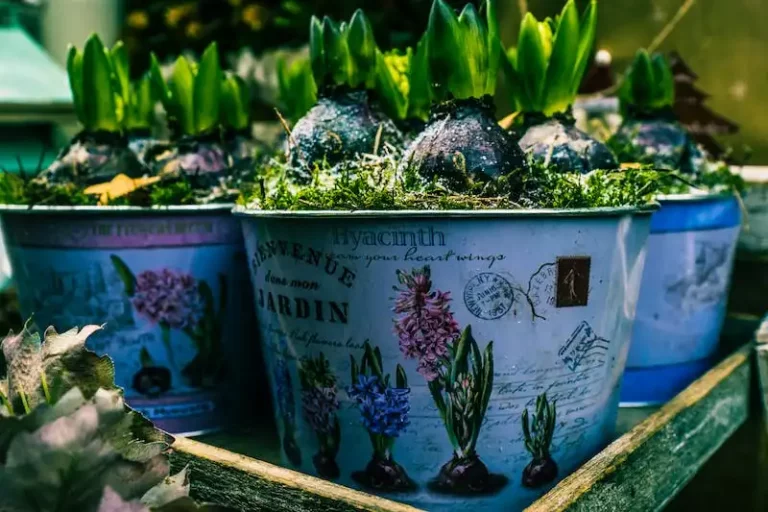Snails can cause a lot of damage to your beloved plants in the garden. These pesky creatures have a reputation for destroying foliage and leaving behind a trail of slime. If you’re tired of dealing with snail troubles, there are several effective ways to keep them at bay. In this article, we’ll explore some of the best snail prevention methods that you can try in your own yard.
One traditional method is to create physical barriers to keep snails out of your garden. This can be done using wire or a fence, ensuring that there are no gaps where snails can slip through. Additionally, placing barriers made of wood or tape around your plants can be an effective way to keep snails away.
Another option is to use natural repellents that are safe for the environment. Eggshells and shredded sea shells can act as deterrents since snails find them uncomfortable to crawl over. Additionally, garlic is known to be an attractive plant for snails and slugs, so planting garlic around your more precious plants can help keep the snails away. However, keep in mind that these repellents need to be replenished regularly and may not be as effective in wet climates.
Methiocarb is a chemical-based snail killer that has been recommended by many people. It can be applied to the garden in pellet form and is effective at killing snails. However, this method may not be suitable for those who prefer more environmentally friendly practices.
Avoiding moisture is another snail prevention method. Since snails prefer cool and damp environments, limiting excess moisture in your garden can discourage them from taking up residence. Ensuring that your soil drains well and removing any standing water can help reduce snail problems.
Lastly, a simple and seemingly magical technique is to employ the power of light. Snails are more active during the night, so inspecting your garden with a flashlight in the early morning hours can help you locate and remove them manually. This hands-on approach may be time-consuming, but it can be a rewarding way to keep your plants safe without relying on chemicals.
In conclusion, there are several ways to prevent snails from eating your plants. Whether you opt for physical barriers, natural repellents, or manual removal, the key is to be proactive and consistent in your efforts. By implementing these preventive measures, you can ensure that your plants thrive and keep those pesky snails out of your garden.
Organic Slug Snail Control
When it comes to keeping slugs and snails away from your plants, there are several organic methods that can be used. These methods have been found to be effective in preventing these pests from damaging your prized gardens without resorting to harmful chemicals.
1. Planting in raised beds or containers can help deter slugs and snails. These pests find it difficult to climb up into the elevated areas where the plants are located, making it less likely for them to reach your plants.
2. Creating barriers is another fine method. By using materials such as copper, shredded bark, or crushed eggshells around your plantings, you can create a physical obstacle that slugs and snails would prefer to avoid. Be aware that slug and snail collars are also available in stores, which can help keep these pests away from vulnerable plants.
3. Trapping can be an effective way to control slugs and snails. Placing traps, such as overturned flower pots filled with beer or shallow pans filled with yeast mixed in water, can attract and drown these pests. This method has been proven to be successful in many gardens.
4. The use of natural baits can also help control these creatures. Some gardeners have found success with baiting slugs and snails using items such as bran, oatmeal, or cornmeal. These substances can be placed near the plants and provide a source of food for the pests, effectively luring them away from your garden.
5. Organic repellents are also available in stores. These products typically contain natural ingredients such as garlic or cedar oil, which produce odors that slugs and snails find unpleasant. Some gardeners have reported success with using these repellents to deter these pests from their gardens.
6. Finally, some organic gardeners have found success in using predatory insects or animals to control slugs and snails. For example, ducks, frogs, or snakes can help keep the population of these pests in check. However, it is important to be aware that introducing such creatures into your garden can also have an impact on other wildlife.
In conclusion, preventing slugs and snails from damaging your plants can be achieved through various organic methods. By implementing these strategies, you can protect your garden and the environment, while still enjoying all the benefits of a healthy and thriving plant life.
Slug Snail control history
Snail and slug control has been a continuous battle for gardeners for many years. There are several methods that have been used over time to prevent these pests from destroying plants.
One of the usual methods for slug and snail control is the use of baits. These baits are usually recommended to be placed in strategic locations where snails and slugs are known to frequent. The baits attract the pests and effectively trap them. One of the better baits that is recommended is Sluggo, an iron phosphate-based snail and slug bait that is safe for humans and pets.
Another method that has been used is the use of barriers. These barriers can be made of different materials such as eggshells or copper. The barrier is placed around the plants to create a physical barrier that the snails and slugs cannot cross. The sharp edges of the eggshells or the electric charge of copper repel the pests.
Some gardeners have also found success in using natural predators to control snails and slugs. Snakes and certain birds, such as ducks and chickens, are known to feed on these pests. Allowing these natural predators to roam the garden can help keep the snail and slug population in check.
There are also some simple home remedies that have been suggested by experienced gardeners. For example, some gardeners have found success with the use of beer traps. A shallow dish is filled with beer and placed in the garden. The snails and slugs are attracted to the beer, fall into the dish, and drown.
In recent years, more environmentally friendly methods of snail and slug control have been developed. These include the use of nematodes, which are microscopic worms that feed on snails and slugs. Nematodes can be purchased at gardening stores and applied to the garden according to the instructions on the package.
In conclusion, there have been many different methods used throughout history to control snails and slugs in gardens. From baits and barriers to natural predators and home remedies, gardeners have tried everything to keep these pests at bay. The most effective solutions involve a combination of methods and an understanding of the nature of snails and slugs. By taking preventive measures and promptly addressing any infestations, gardeners can keep their plants safe from these pesky pests.
1 Coffee Grounds
One effective way to deter snails from eating your plants is by using coffee grounds. This natural method is easy to implement and has shown great results for many gardeners.
Coffee grounds create a barrier that snails find difficult to cross. This is because the texture of the grounds is abrasive and can be uncomfortable for the slimy creatures. Additionally, the strong smell of coffee can help mask the scent of your plants, making them less attractive to snails.
To use coffee grounds as a snail deterrent, simply sprinkle a line of grounds around the base of your plants. Work the grounds into the soil a bit to ensure they stay in place. You can reapply the grounds after watering or every morning to maintain their effectiveness.
March is the perfect time to start using coffee grounds, as snails tend to become more active during this period. By implementing this simple trick, you can protect your garden from these pesky pests and enjoy healthy, slug-free plants.
Although coffee grounds are generally safe for plants, it’s important to note that they should be used in moderation. Too much coffee can gradually raise the acidity of the soil, which may not be suitable for all plants. It’s best to do some research on the specific plants you have in your garden and adjust your coffee ground usage accordingly.
If you have a live snail problem and want a more immediate effect, a coffee ground trap can be a great solution. Simply place a small container, such as a yogurt cup, in your garden. Fill it with coffee grounds and pour in a bit of beer as well. Snails are attracted to the combination of coffee and beer, and they will crawl into the trap and drown. Empty the trap regularly to keep it effective.
Another alternative is to mix coffee grounds with water to create a spray. Spray this mixture directly onto snails to repel them. This method is best used when you spot snails in your yard but want to avoid using toxic chemicals.
Furthermore, coffee grounds can be used as an effective mulch in your garden. Spread a layer of coffee grounds around your plants to deter snails and enrich the soil. This can help with moisture retention and also act as a slow-release fertilizer.
When identifying snail damage, look for ragged edges on leaves and chewed stems. These small pests are capable of quickly eating through your plants and leaving them looking unsightly. By using coffee grounds and other snail deterrents, you can keep your garden healthy and beautiful.
Copper is another material that has been taught to repel snails. Many snail traps sold in gardening stores are made of copper, as snails and slugs do not like to crawl across it. Using copper barriers or copper tape around the edges of your garden beds can deter snails from entering.
In conclusion, coffee grounds can be a great natural solution to keep snails away from your plants. Whether using them as a barrier, in a trap, or as a mulch, coffee grounds have been proven effective in repelling snails and protecting your garden. Give coffee grounds a try and enjoy a snail-free garden today!
2 Beer Trap
One simple and effective way to keep snails away from your plants is by using a beer trap. Snails are attracted to the smell of beer, and this trap takes advantage of that. Here’s how to set up a beer trap:
| Materials: | Empty shallow containers, such as yogurt or margarine tubs |
| Beer (any kind will work) |
Instructions:
- Find a suitable location in your garden where you’ve noticed snail activity.
- Fill the shallow containers with beer, leaving just enough space for the snails to crawl in.
- Bury the containers in the ground, making sure the rim is level with the soil surface.
- Snails will be attracted to the beer and crawl into the containers to reach it.
- Once inside, they will drown in the beer and you can dispose of them in compost or discard them.
By using a beer trap, you can effectively control snail populations without the need for harmful pesticides or chemicals. It’s a natural and eco-friendly method that not only keeps your plants safe but also helps recycle and reduce waste.
Keep in mind that beer traps are most effective when used in conjunction with other preventive measures. Here are some additional suggestions:
- Remove any snail eggs or snails you find by hand.
- Keep your garden clean and free of debris, as snails love to hide in damp and cluttered areas.
- Use physical barriers, such as copper tape or crushed eggshells, around plants to deter snails.
- Create a dry border around your garden using gravel or crushed stones, as snails dislike crossing it.
- Encourage natural predators, like birds, frogs, and toads, to visit your garden, as they feed on snails.
- Consider planting snail-resistant plants, such as ferns, lavender, or certain types of basil.
- Maintain good cultural practices, such as watering in the morning and keeping the soil well-drained, as excessively moist conditions attract snails.
- Regularly inspect your garden for signs of snail activity and take appropriate action.
By following these tips, you can create an environment that snails will want to avoid, protecting your plants and ensuring a healthy garden.




